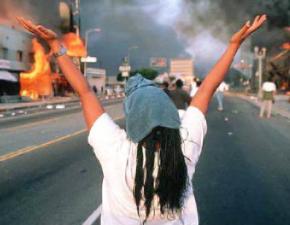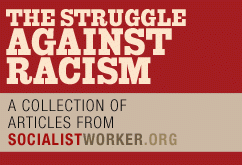A rebellion against racism
This month marks the 20th anniversary of one of the fiercest urban uprisings in U.S. history--the Los Angeles Rebellion. At the time, politicians and the media focused on the property damage that took place. They did their best to discredit the uprising as "wanton destruction" and "mob brutality" carried out by "criminals" and "gangs."
But in reality, the LA Rebellion expressed in the most decisive terms the raging, accumulated bitterness caused by racism and class inequality. For everyone interested in social justice, it should be remembered as an inspiring example of working-class people refusing to be treated like animals--an upheaval in which, as left-wing writer Mike Davis put it, "a generation found that it can fight back."
In this article that originally ran in the April 26, 2001, issue of Socialist Worker, looked back at the lesson for LA Rebellion.
THE LA Rebellion was sparked by the unbelievable acquittal--by an all-white jury--of four white cops who had viciously beaten Rodney King, an unemployed, Black construction worker. There was no question of the cops' guilt. An onlooker had captured the entire beating on videotape, which was replayed on televisions around the country.
The Rodney King case highlighted a simple fact: There's no justice for Blacks in the U.S. Outrage swept across the country. No city was too big or too small to have organized protests on campuses and at city halls.
But the center of the upheaval was in South Central Los Angeles. LA had been particularly hard hit by the recession that began strangling the U.S. economy in 1990--a slump that became the longest economic downturn since the Second World War.
Black LA was especially hard hit, with unemployment for young Blacks jumping to 45 percent. Wrenching poverty, combined with corrupt police and an openly racist criminal justice system, created not only desperation, but intense anger.

This explains the most remarkable aspect of the LA Rebellion--that it involved not only Blacks, but also young Latinos, whites and Asians. As LA's African American Mayor Tom Bradley said, "Most of the people who were engaged in the violence were young whites."
Of the first 5,000 people arrested by police, 52 percent were Latino, 10 percent were white and 38 percent were African American. Poll after poll showed the simmering discontent of both Blacks and whites in the wake of the King verdict.
A poll taken by USA Today showed that 100 percent of Blacks and 86 percent of whites thought that the verdict was wrong. Another poll found that 90 percent of Blacks and 63 percent of whites said that the King case was evidence of widespread racism in U.S. society.
The multiracial character of the uprising pointed to deepening class inequality. At the time, a record 24.5 million Americans received food stamps--with unemployment reaching 7 percent just before the riots. Studies revealed that family income had fallen 13 percent between 1973 and 1991.
But as conditions for the working class as a whole worsened, a social catastrophe was unfolding in Black America. One-third of Blacks--compared to 10 percent of whites--lived below the poverty line. Latinos faced only slightly lower rates of poverty at 26 percent.
Unemployment for Blacks jumped above 13 percent--and in the inner cities, it ranged from 34 percent to 50 percent.
UNLIKE THE urban rebellions of the 1960s, which occurred after more than a decade of civil rights mobilizations, the LA riots came after a period of decline for the left. This helps explain the immaturity of the rebellion, illustrated by its spontaneous explosion and just as rapid decline--and its negative aspects, such as attacks on Korean shop owners.
The media portrayed looting that focused on Korean-owned stores as a virtual pogrom. But the reasons behind these attacks were more complicated. For many Blacks living in South Central, the shop owners--who often charged inflated prices and treated Blacks unfairly--became a focus for their bitterness.
Tensions between Blacks and Koreans had come to a head a year before, when a shop owner shot and killed a 15-year-old Black girl in a fight over a bottle of orange juice. He was let off with a $500 fine and community service.
But while this explains the anger behind them, the attacks were still misdirected. Koreans may have been seen as "the middleman community between people in the ghetto--Black and Mexican--and big capital," as Davis put it. But they weren't responsible for racism and police brutality. In fact, a segment of the Korean community supported the rebellion.
The targeting of Korean shop owners was a backward aspect of the LA Rebellion--and in sharp contrast to the multiracial, class nature that characterized it.
In many ways, the riots also underscored the deepening class divisions within Black America. The election of a Black mayor had done absolutely nothing to improve the conditions faced by poor African Americans in LA.
The same could be said of Blacks living in every major U.S. city with Black mayors, from New York to Chicago to Atlanta--life didn't get better, and in most cases, it got worse.
MORE THAN anything, the LA Rebellion forced the political establishment to admit that racism was a problem in U.S. society. As the Wall Street Journal put it at the time: "Race is returning to the front burner."
And the rebellion certainly showed just how out of touch President George Bush was. Like Reagan, Bush's political strategy had rested on denying that racism existed--while at the same time taking political race-baiting to new levels. From the racist stereotype of the "welfare queen" to the "war on drugs," Reagan and Bush stoked bigotry for 12 long years.
Now Papa Bush, who had been riding high with 90 percent approval ratings after his victory in the 1991 Gulf War, suddenly found himself in a fight for his political life as the economy crumbled.
The Democratic presidential nominee, Bill Clinton, used the rebellion--with the help of local Black politicians like U.S. Rep. Maxine Waters--to attack Bush and shore up his own campaign. Waters personally escorted Clinton through South Central LA as a campaign stop.
There, Clinton capitalized on hatred of Bush--at the same time as he attacked people who looted stores "because they do not share our values and their children are growing up in a culture alien from ours, without family, without neighborhood and without church, without support." The problem would be solved, Clinton declared, if the poor took more "personal responsibility."
Black political leaders and the liberal establishment threw their weight behind Clinton--using the LA Rebellion as an example of how desperate things had become under Bush, but accepting Clinton's rhetoric about "personal responsibility." This proved disastrous.
Under Clinton, America's prison population exploded to unthinkable levels. Police scandals were rampant throughout the 1990s, even as Clinton showered police departments with billions of dollars with his 1995 crime bill. And, as promised, "personal responsibility" became the order of the day, with Clinton adopting a Republican plan to dismantle the welfare system.
Mainstream Black organizations organized virtually no opposition to these attacks on poor and working-class African Americans. In fact, the factors that sparked the LA rebellion 10 years ago--racism and the ever-widening gap between rich and poor--exist today.
The LA Rebellion should serve as a reminder to the parasites at the top of society that ordinary people won't simply accept racism, police abuse and poverty. And it should be a reminder to our side of the potential for ordinary people to explode into action--behind the slogan: "No justice, no peace!"



